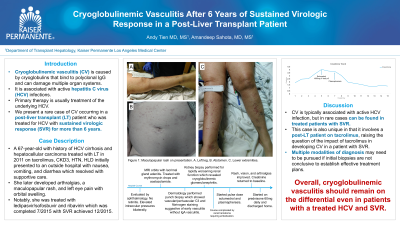Back


Poster Session A - Sunday Afternoon
Category: Liver
A0569 - Cryoglobulinemic Vasculitis After 6 Years of Sustained Virologic Response in a Post-Liver Transplant Patient
Sunday, October 23, 2022
5:00 PM – 7:00 PM ET
Location: Crown Ballroom

Has Audio

Andy Tien, MD, MS
Kaiser Permanente Los Angeles Medical Center
Los Angeles, CA
Presenting Author(s)
Andy Tien, MD, MS, Amandeep Sahota, MD, MS
Kaiser Permanente Los Angeles Medical Center, Los Angeles, CA
Introduction: Cryoglobulinemic vasculitis (CV) is caused by cryoglobulins that bind to polyclonal IgG and can damage multiple organ systems. It is associated with active hepatitis C virus (HCV) infections and the primary therapy is usually treatment of the underlying HCV. We present a rare case of CV occurring in a post-liver transplant (LT) patient who was treated for HCV with sustained virologic response (SVR) for more than 6 years.
Case Description/Methods: A 67-year-old with history of HCV cirrhosis and hepatocellular carcinoma treated with LT in 2011 on tacrolimus, chronic kidney disease stage 3, hypertension, hyperlipidemia initially presented to an outside hospital with nausea, vomiting, and diarrhea which resolved with supportive care. She later developed arthralgias, a maculopapular rash, and left eye pain with orbital swelling. She was evaluated by ophthalmology without findings of retinitis but with bilateral elevated intraocular pressures. MRI orbits revealed lacrimal gland adenititis treated with topical medications including erythromycin and systemic acetazolamide. Dermatology evaluated patient with a skin punch biopsy which showed vascular/perivascular C3 and fibrinogen staining suggestive of early vasculitis without evidence of IgA vasculitis. Notably, she was treated with ledipasvir/sofosbuvir and ribavirin which was completed 7/2015 with SVR achieved 12/2015. HCV RNA viral load was again negative as well as other viruses. Due to rapidly worsening renal function with creatinine rising to 3.8 from baseline of 1.3-1.5, a renal biopsy was performed which revealed cryoglobulinemic glomerulonephritis—establishing a diagnosis of CV. Patient’s course was complicated by a biopsy-related renal hematoma requiring embolization. She was treated with pulse dose solumedrol and plasmapheresis. Shortly after treatment, her rash, vision, and arthralgias improved. Her creatinine returned to baseline and she was started on prednisone 60mg daily.
Discussion: CV is typically associated with active HCV infection, but in rare cases can be found in treated patients with SVR. This case is also unique in that it involves a post-LT patient on tacrolimus, raising the question of the impact of tacrolimus in developing CV in a patient with SVR. Moreover, multiple modalities of diagnosis may need to be pursued if initial biopsies are not conclusive to establish effective treatment plans. Overall, CV should remain on the differential in patients with a treated HCV and SVR.
Disclosures:
Andy Tien, MD, MS, Amandeep Sahota, MD, MS. A0569 - Cryoglobulinemic Vasculitis After 6 Years of Sustained Virologic Response in a Post-Liver Transplant Patient, ACG 2022 Annual Scientific Meeting Abstracts. Charlotte, NC: American College of Gastroenterology.
Kaiser Permanente Los Angeles Medical Center, Los Angeles, CA
Introduction: Cryoglobulinemic vasculitis (CV) is caused by cryoglobulins that bind to polyclonal IgG and can damage multiple organ systems. It is associated with active hepatitis C virus (HCV) infections and the primary therapy is usually treatment of the underlying HCV. We present a rare case of CV occurring in a post-liver transplant (LT) patient who was treated for HCV with sustained virologic response (SVR) for more than 6 years.
Case Description/Methods: A 67-year-old with history of HCV cirrhosis and hepatocellular carcinoma treated with LT in 2011 on tacrolimus, chronic kidney disease stage 3, hypertension, hyperlipidemia initially presented to an outside hospital with nausea, vomiting, and diarrhea which resolved with supportive care. She later developed arthralgias, a maculopapular rash, and left eye pain with orbital swelling. She was evaluated by ophthalmology without findings of retinitis but with bilateral elevated intraocular pressures. MRI orbits revealed lacrimal gland adenititis treated with topical medications including erythromycin and systemic acetazolamide. Dermatology evaluated patient with a skin punch biopsy which showed vascular/perivascular C3 and fibrinogen staining suggestive of early vasculitis without evidence of IgA vasculitis. Notably, she was treated with ledipasvir/sofosbuvir and ribavirin which was completed 7/2015 with SVR achieved 12/2015. HCV RNA viral load was again negative as well as other viruses. Due to rapidly worsening renal function with creatinine rising to 3.8 from baseline of 1.3-1.5, a renal biopsy was performed which revealed cryoglobulinemic glomerulonephritis—establishing a diagnosis of CV. Patient’s course was complicated by a biopsy-related renal hematoma requiring embolization. She was treated with pulse dose solumedrol and plasmapheresis. Shortly after treatment, her rash, vision, and arthralgias improved. Her creatinine returned to baseline and she was started on prednisone 60mg daily.
Discussion: CV is typically associated with active HCV infection, but in rare cases can be found in treated patients with SVR. This case is also unique in that it involves a post-LT patient on tacrolimus, raising the question of the impact of tacrolimus in developing CV in a patient with SVR. Moreover, multiple modalities of diagnosis may need to be pursued if initial biopsies are not conclusive to establish effective treatment plans. Overall, CV should remain on the differential in patients with a treated HCV and SVR.
Disclosures:
Andy Tien indicated no relevant financial relationships.
Amandeep Sahota indicated no relevant financial relationships.
Andy Tien, MD, MS, Amandeep Sahota, MD, MS. A0569 - Cryoglobulinemic Vasculitis After 6 Years of Sustained Virologic Response in a Post-Liver Transplant Patient, ACG 2022 Annual Scientific Meeting Abstracts. Charlotte, NC: American College of Gastroenterology.

